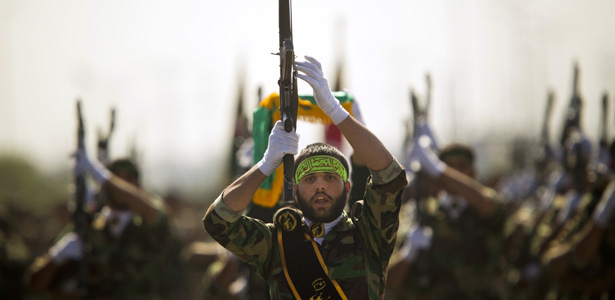
EDITORS’ NOTE: Reuters and other foreign media are subject to Iranian restrictions on their ability to report, film or take pictures in Tehran.
Members of Iran’s Basij militia march during a parade to commemorate the anniversary of the Iran-Iraq war (1980-88), in Tehran September 22, 2010. REUTERS/Morteza Nikoubazl (IRAN – Tags: ANNIVERSARY MILITARY POLITICS)
Nothing illustrates the confusion over the nuclear deal with the Iranian regime than one simple fact: Even as the Obama administration is encouraging new trade and investment opportunities with the regime as a reward for the deal, it is also at the same time seeking to impose new economic sanctions for violating prohibitions against developing nuclear-capable ballistic missiles.
The flip-flopping is emblematic of what makes diplomacy towards the mullahs in Tehran an exercise in frustration and futility because the truth of the matter is that they are not committed to a path towards true peace and civility. Rather Iranian leaders such as Ali Khamenei and Hassan Rouhani are playing the long game of chess moves designed to break down barriers; allowing the regime to access resources while playing off the desires of the West for peace vs. pushing the envelope of newly aggressive acts.
The mullahs and their allies in the Iran lobby recognize that time is running out to play this game since virtually all of the leading contenders to replace President Obama this fall have denounced the regime and have publicly staked out territory to hold the mullahs accountable.
Consequently, regime allies such as Trita Parsi and Reza Marashi of the National Iranian American Council have been usually quiet in their public statements and social media posts about what is happening with Iran such as the missile launchings, the smuggling of weapons to Yemen, the escalation in sending fighters to Syria and the continued incarceration of dissidents and journalists in Iran.
The strategy for them is to be as deaf and dumb as a lamp post and not provide fodder for the foes of Iran to tee off against them and expose the hypocrisy of their support for a regime which has ably shown itself to have intentions or desires for moderation.
Matthew Lee, the Associated Press’ diplomatic writer, examined this conundrum for the Obama administration over the weekend.
“Eager that a successful deal and a new era in the U.S.-Iran relationship be part of President Barack Obama’s legacy, his administration finds itself encouraging foreign trade with Iran even as it forbids most American commerce with the Islamic Republic. Those efforts are complicated by the fact that the United States continues to condemn and try to punish Iranian actions in non-nuclear arenas such as Tehran’s support of terrorist groups and belligerence toward Israel,” Lee writes.
“Asian and European government and companies, primarily banks, are balking at doing now-legal business with Iran, because of uncertainty over those remaining sanctions. They want written clarification about what current U.S. laws and financial regulations allow them to do. Essentially, they want a promise that the U.S. will not prosecute or punish them for transactions that involve Iran,” he added.
The fact that the Obama administration is trying to navigate a path for the Iranian regime to receive benefits from the nuclear deal even as it violates other international agreements demonstrates how ineffective U.S. policy has become in reigning in the mullahs and the Revolutionary Guard Corps.
What has not been focused on by most Western media is the intricate network of Iranian companies owned and operated by the Revolutionary Guard Corps and regime leaders and their families such as Khamenei.
In 2013, Reuters published a three-part investigation into what it called Ayatollah Assets. Now, Khamenei wants certain companies to be the main beneficiaries from lifting the sanctions, mainly the economic arm of the Revolutionary Guard — stamped by many around the globe as a terrorist organization.
The fact that Khamenei has been on a verbal rampage over the slow drip of funds into companies he controls is not so much a desire to help ordinary Iranians as much as it represents his frustration over not getting his payday and like a petulant child, Khamenei has ordered a paramilitary force comprised of zealot students loyal to him to fight in Syria.
A media group close to the Iranian government, Mehr News Agency, reported Tuesday at least 30 members of the regime’s Basij Resistance Force have been killed fighting in Syria and Iraq. Iran’s military influence in both countries is significant, with around 212 killed in both countries, according to a report by Al-Jazeera. Analysts conservatively estimate there are around 7,000 Iranian forces operating in Iraq and Syria.
While the Iranian regime escalates its military involvement in Syria, the Obama administration held its second Nowruz celebration observing the Persian New Year with First Lady Michelle Obama. It is worth noting the flood of social media messages coming in from activists and Iranian dissidents urging the First Lady not to forget about the terrible human rights abuses going on in Iran.
Protests over the regime’s policies though come in all sizes and shapes and its latest request comes in response to the plight of a group of female crew members at a French airline.
When it was announced that Air France would begin flying into Tehran after an eight year hiatus, a number of the female crew demanded the right to opt-out of working on the new route. Many objected to an internal memo asking them to wear a hijab when disembarking the plane in the Iranian capital.
The crew members have now won the battle. On Monday Air France announced it would allow its female staff to be reassigned to other flights, should they not wish to fly to Iran.
We can only hope that more acts of “soft power” defiance take place in support of those shackled by the regime.
By Michael Tomlinson